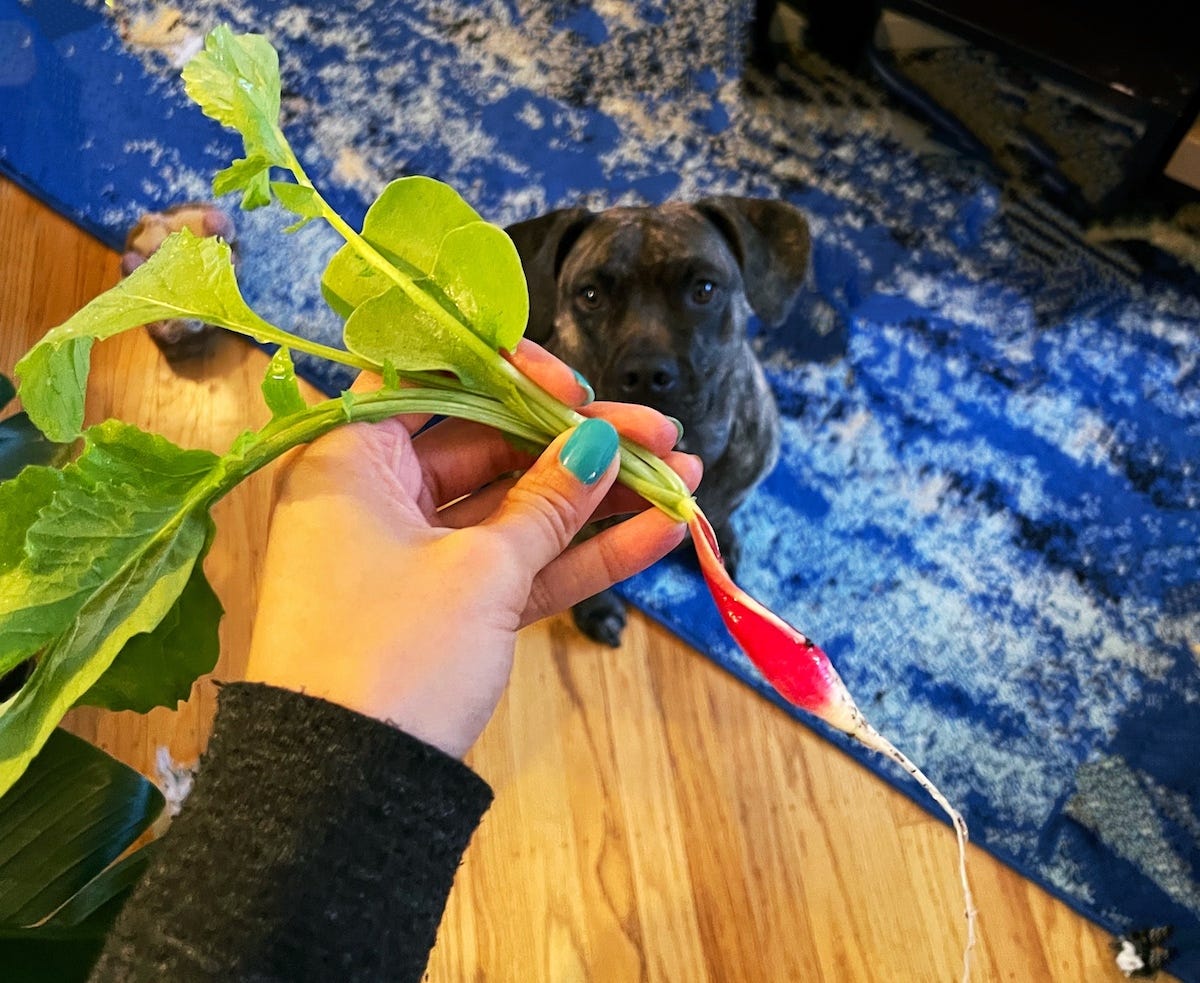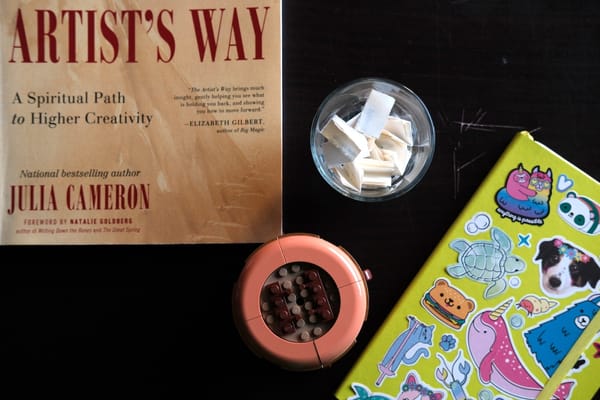Listening to your gut
Mine gives me valuable opinions, though I don't always go with it
Note from Jenn:
This past weekend, I went to a free (free!) Cold War Kids concert as part of Stern Grove Festival. The last time I saw them was 12 years ago. General admission tickets situate you in the slope of a forest. This is not an exaggeration. At a near 45° angle, we sat on blankets that covered leaves and branches, beneath towering trees. It was the most unique concert experience I’ve had yet.
I am testing a new audio feature where I read my newsletter aloud. It’s not a podcast. If you use the feature and enjoy it, do let me know.
I was interviewed by Kat Melheim for this piece on coffee branding in Roast Magazine. And I published my article on workplace boundaries in Sprudge. This article is one of my favorites that I’ve ever written and it’s on a topic that’s rarely discussed in the coffee space.

Listening to your gut
I didn’t grow up listening to my gut.
I’m sure it’s partly because my culture values a collective over an individual. Listening to your gut means you are putting yourself first and acknowledging your feelings as valuable. Neither are things I was taught to do.
It’s a skill (does it count as a skill?) I’ve been trying to develop. I’m not always successful, mind you. Like the time I knew, just knew, that I should stop working but still pushed myself to finish. I paid for it later with hours of brain fog and exhaustion. If I had listened to my gut earlier, I wouldn’t have completed an entire pre-veterinary track in undergrad before deciding that it wasn’t for me.
When my gut talks to me, it shows up as a niggling thought poking around the edges of my mind. It’s a small pit in my stomach. It’s a physical anxiety symptom that was unconsciously triggered. It doesn’t “feel right” – or maybe it does!
Instinct is not synonymous with impulsiveness or spontaneity. In one, an inner voice or physical reaction is telling you something. In another, your brain is just saying, go go go, don’t think! I am not a spontaneous person. Anxiety does not lend itself to being spontaneous. Instead, it’ll put every detail under the microscope, blowing their relevance out of proportion. But at that moment, it’ll feel extremely important to get everything right. You can listen to your gut but also not act on it immediately. I think the two sometimes get conflated.
When you work solo, you try to use all your available resources. I consider my gut to have an opinion that is worth considering. I don’t listen to it every time, but I at least consider it.
The one trick I’ve learned about making a decision where you have two choices is to take a coin and assign a decision to each side. Flip it. Whatever it lands on, assess your immediate reaction to it.
In this reflection on making decisions, writer Caroline Donofrio covers another method: asking yourself an important question.
“When it comes to making decisions, I always ask myself: Does it feel expansive or contractive?” she said. The idea was first written about by life coach Marie Forleo.
Expansiveness feels light, powerful, exciting. To me, it’s like the sensation you get after a workout or when you’re “in the zone” doing something you love. When you can’t wait to get started on something, there’s a good chance you’re feeling expansive.
Contractive feelings exist at the other end of the spectrum — heavy, tight. Perhaps it carries with it a sense of dread or secrecy. You can also sense it physically — are you hunched over? Is your jaw clenched? Do you feel like you’re stuck in molasses? If so, your intuition may be telling you it’s a no.
Upon further research, I’ve found that listening to your gut is indeed a skill and that it’s sometimes referred to as your “second brain.”
Previous research on the gut-brain axis has identified a strong connection between our affective feeling states and the numerous neurotransmitters that reside in our gut microbiota.
The gut-brain connection involves various neurotransmitters that influence our feelings and emotions. High comorbidity between anxiety disorders and irritable bowel syndrome supports the idea that when something is wrong, it often physically manifests in our stomach. Think of it as a digestive alarm system, letting us know when we might be overworked, upset, or feeling a little too stressed out.
The last time I listened to my gut, I rebranded my newsletter. It felt right. I felt excited. I didn’t dread the next time I had to write it. I also felt scared because it’s a big change, and while I logically know that change is good and should be embraced, it also made me vulnerable to potential what-ifs. There was only so much I could plan for and everything else is left to the universe. Side note: The Artist’s Way is very into spirituality, and I have had to force myself to attempt a belief in affirmations like “the universe has the power to accomplish my dreams.”
So, when was the last time you listened to your gut and it worked out in your favor? Have you valued your gut more since then?

🤳🏻 social media
Instagram added in Reels templates because it wants people to create more Reels. It’s testing AR elements within stories.
Meta added the ability to have community managers as moderators on Lives.
Twitter added a closed caption toggle. And it’s testing Twitter Write, which they are describing as “Notes + Revue” — so thank goodness I moved off Revue! The Notes display like longform articles but within Twitter.
📤 digital marketing
- How to Make Stunning Social Media Graphics Even if You’re Not an Artist: Not every social media manager is a pro graphic designer. Here are tips and tools to help you fool your followers into thinking you are one.
- 10 Email Newsletter Templates Subscribers Will Love: Email is no longer a tactic for the tech-savvy. Instead, it’s an essential part of any small business marketing strategy, and it shouldn’t be ignored or forgotten in favor of more “trendy” channels.
- The Pros and Cons of Influencer Marketing for Your Brand [Infographic]: Are you considering investing in an influencer marketing campaign for your business? Want to know the positives and negatives of using influencers on social media?
👀 interesting reads
- Negotiation Tips for Writers and Creatives: Negotiation “is something you can practice, a skill you can develop. Everyone can learn it.”
- The Unbreakable Rules of the Chicago Dog—and When to Bend Them: In the Windy City, brook no compromises. Everywhere else, work with what you’ve got.
- Can a corporation "own" a color?: A handful of companies have pushed the boundaries of intellectual property law by laying claim to individual colors.
- What's the deal with all those weird wrong-number texts?: Digging into the world of "pig-butchering" scams. [And now I know what other text scam themes to look out for.]






